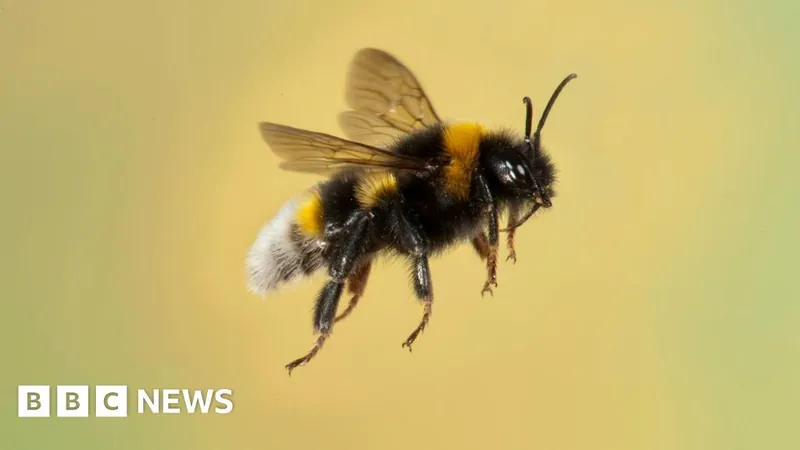
Bumblebees Risk Early Nesting in Winter due to Climate Change Consequences
2025-01-08
Author: Li
Bumblebees at Risk Due to Climate Change
In a startling discovery, conservationists have reported that bumblebees in Scotland are beginning to establish their nests during the winter months, a phenomenon linked to the ongoing impacts of climate change. Over the holiday season, active worker bumblebees were spotted in Aberdeen, taking advantage of the unusually mild weather conditions.
The charity Buglife, which focuses on the conservation of invertebrates, highlighted that their previous surveys indicated the presence of both bumblebees and honeybees across the UK during the festive period. Reports of these sightings stretched from Jersey all the way to the Highlands, a range that underscores the resilient nature of these insects.
Risks of Early Nesting
However, this early nesting poses severe risks to the bee populations. Buglife warns that these nests face a "high risk" of failing due to the limited availability of flowers for the bees to forage for nectar and pollen, as well as the potential return of cold, harsh weather that could jeopardize the newly established hives.
Typically, bumblebees are known to hibernate throughout the winter, emerging into spring to continue the vital work of pollination. But this year’s warm Christmas was quickly followed by colder conditions, further complicating the situation for these crucial pollinators. Reports suggest that at least two of the UK's 25 bumblebee species might be at risk, having started their nests far earlier than usual.
Paul Hetherington from Buglife commented on the situation, sharing that an observation made by one of his colleagues in Aberdeen confirms that not only have the queen bumblebees roused from their hibernation, but they have also gone to the extent of initiating new nests. This behavior poses a considerable risk, as the lack of floral resources and the instability of winter weather may threaten the survival of these developing nests.
"If these nests collapse due to environmental pressures, we may face a dramatic decline in queen production," Hetherington explained. "Such a reduction could lead to a further decline in bumblebee populations come spring, exacerbating a trend we've seen globally."
Impacts on Public Health and Biodiversity
Adding another layer of complexity to the warmer winter, areas in Scotland have also seen an uptick in tick activity, typically limited to the spring through autumn months. This rise in ticks poses health risks, including the spread of Lyme disease, which can have serious implications for human health. One such tick was spotted in Inverness' Ness Castle area, highlighting the unforeseen consequences of climate change on both pollinators and public health.
The ongoing changes in bumblebee behaviors and the implications of a warming climate underscore an urgent need for awareness and action. As these bees are essential for pollinating a multitude of crops, their declining populations could spell trouble for biodiversity and food security.
 Brasil (PT)
Brasil (PT)
 Canada (EN)
Canada (EN)
 Chile (ES)
Chile (ES)
 Česko (CS)
Česko (CS)
 대한민국 (KO)
대한민국 (KO)
 España (ES)
España (ES)
 France (FR)
France (FR)
 Hong Kong (EN)
Hong Kong (EN)
 Italia (IT)
Italia (IT)
 日本 (JA)
日本 (JA)
 Magyarország (HU)
Magyarország (HU)
 Norge (NO)
Norge (NO)
 Polska (PL)
Polska (PL)
 Schweiz (DE)
Schweiz (DE)
 Singapore (EN)
Singapore (EN)
 Sverige (SV)
Sverige (SV)
 Suomi (FI)
Suomi (FI)
 Türkiye (TR)
Türkiye (TR)
 الإمارات العربية المتحدة (AR)
الإمارات العربية المتحدة (AR)